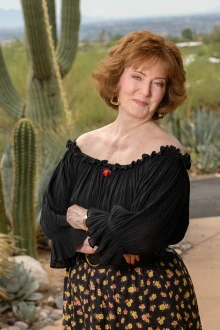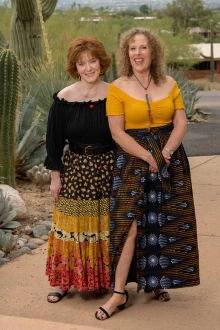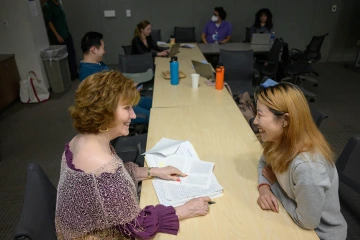A powerful voice for her students
Pritchard uses skills honed on the opera stage to help her psychiatry students find the style that works for them.
Barbara E. Pritchard, PhD, sat in the emergency room next to her comatose mother, waiting for her last breath.
Tears trickled down Pritchard’s face. Her hand rested gently on her mother’s. Pritchard’s stepfather was there. So was her brother, his wife and the pastor of her parents’ church. Except for the beeping of the machines monitoring vital signs, the room was silent. Then Pritchard did what came naturally – sing.

Barbara E. Pritchard, PhD, has been with the Department of Psychiatry at the University of Arizona College of Medicine – Tucson since 1997.
“There is a balm in Gilead to make the wounded whole…”
Pritchard serenaded her mother with a favorite hymn.
“There is a balm in Gilead to heal the sin-sick soul…”
Her mother, who had chronic obstructive pulmonary disease and endured bouts of lung cancer, moaned softly. Then, she stirred.
Much to everyone’s surprise, over the next few hours she emerged from the coma. She lived another two years.
“That’s the power of music, to reach others at even an unconscious level,” said Pritchard, a clinical associate professor in the Department of Psychiatry at the University of Arizona College of Medicine – Tucson. “It’s unmistakable.”
Shining through even when the lights dim
The youngest of three and the only daughter, Pritchard grew up in Phoenix. Studious and self-disciplined, she sang in choirs, happy to lend her pipes however they were needed – a pitch, rather than pinch, hitter, if you will. She’d chime in as a soprano at church and alto in the school choir. She was happy to blend in, be part of the crowd. It wasn’t until much later in life she found herself center stage.

Barbara E. Pritchard, PhD, and professional opera singer and voice teacher Korby Myrick aren’t just teacher and student – they’re also longtime friends and singing partners.
Singing simmered in the background when Pritchard headed off to college, planning to major in English literature and German literature. Turns out psychology was a much better fit and so she studied it, eventually earning a PhD in clinical psychology and clinical neuropsychology from UArizona. She launched her own private practice and began teaching at her alma mater. With her career well underway, Pritchard auditioned for a touring singing group only to have the director pull her aside and urge her to go solo.
Pritchard is a spinto soprano, which translates to a voice full of richness and power that can still hit lighter, lyrical notes. It’s the kind of voice that can make a loose light bulb flicker in its base on the high notes of an aria — which happened during a performance. She carried on despite the distraction.
“You just keep singing and make the best of it,” said Pritchard, who enjoys listening to classical music and jazz as well as Taylor Swift. “It’s very fun.”
Giving students their voice
Jason Curry, DO, program director of the Psychiatry Residency Program, said he’s had the privilege of watching Pritchard sing – and that it’s every bit as “magical” as watching her teach.
He described Pritchard, who teaches several seminars and supervises senior psychiatry residents, as the department’s most decorated faculty member. Students have repeatedly given her excellence in teaching awards for her work guiding them in psychodynamic psychotherapy, which helps clients uncover and understand unconscious patterns of behavior affecting their lives.
Curry, who’s also an assistant professor of clinical psychiatry and vice chair for education in the department, said

Barbara E. Pritchard, PhD, teaches seminars and supervises senior psychiatry students, and has received multiple awards from her students.
the process of learning the theories of psychotherapy is referred to as helping new therapists “find their style” or “their voice.” He pointed to an evolutionary theory that song and singing came before speech and language.
“As word follows song, on a path more ancient than our knowing, Barbara is there on the path, as a stalwart and sage, connecting us to the joy of being,” he said. “She helps others find their voice.”
It’s a job she’s more than happy to do.
Over the years, Pritchard supervised the psychotherapy component of several Department of Psychiatry research studies in chronic depression. Her efforts were recognized by the Arizona Psychological Association with a special award during its 50th anniversary convention in 2000. But it’s her impact on future generations that’s particularly meaningful to Pritchard.
“I think the idea of influencing cohorts – generations even – of young psychiatrists and, in turn, the patients with whom they work over the course of their careers, like a pyramid effect, is what I find gratifying,” she said.
Connecting with her audience
Over the years Pritchard has taken voice lessons and studied in California and New York. These days, she has a standing Friday lesson with professional opera singer and voice teacher Korby Myrick, a Tucson native.
Between Pritchard’s vocal cords and psychology background, she’s uniquely suited for dramatic roles with a wide emotional range. Pritchard has even given lecture recitals on operas in which she breaks down the opera and sings excerpts. She said she enjoys diving into her characters and what motivates them.
She’s sung with Arizona Opera and at large venues, but Pritchard is most excited about working with local group Passion Project: Opera!, which books performances in intimate settings that allow ticketholders to interact with performers.
“What’s wonderful is that you can see the audience and their faces and expressions,” Pritchard said. “To see an audience member moved to tears when you’re performing and singing something, it’s a very powerful experience. It kind of reverberates between you and an audience member in a way that you can’t quite have when you look out into footlights.”
It’s the same kind of connection she enjoys with her students.
“When you love what you do, it makes a difference,” Pritchard said. “I can't imagine working in a field that I didn't love.”

